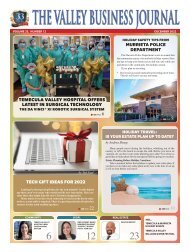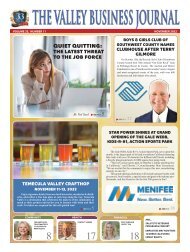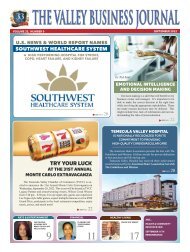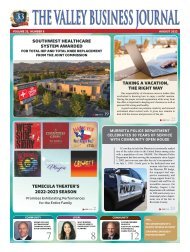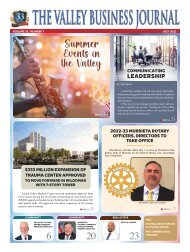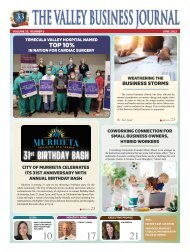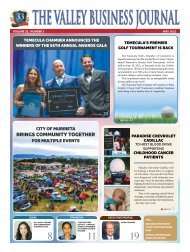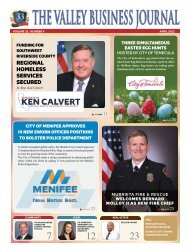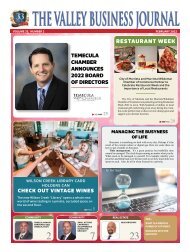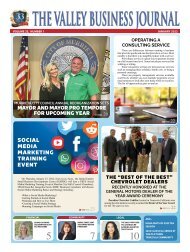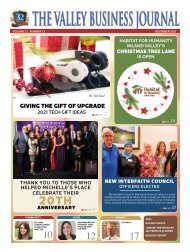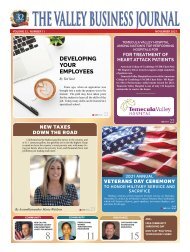March 2017
You also want an ePaper? Increase the reach of your titles
YUMPU automatically turns print PDFs into web optimized ePapers that Google loves.
<strong>March</strong> <strong>2017</strong><br />
THE VALLEY BUSINESS JOURNAL<br />
www.TheValleyBusinessJournal.com<br />
13<br />
10 Things You May Want to Do After an<br />
Auto Collision<br />
6. EXCHANGE INFORMATION. Typically,<br />
the investigating police officer<br />
obtains this information. However, if<br />
the police do not arrive after your telephone<br />
call, you should try to obtain<br />
the names, addresses and telephone<br />
numbers of all persons involved in<br />
the accident, drivers and passengers<br />
alike. You should also try to obtain<br />
information about the other party’s<br />
insurance by asking to see the insurby<br />
Mort Grabel<br />
If involved in a collision, there are<br />
specific actions to take to protect your interests.<br />
The following information while<br />
not complete are the top ten suggestions:<br />
1. STOP. Never drive away from the<br />
scene of a collision, even a minor one.<br />
Always investigate, obtain names,<br />
take pictures, etc [see below].<br />
2. PROTECT THE SCENE OF THE<br />
ACCIDENT. You may prevent further<br />
accidents with flares or keeping your<br />
flashers on.<br />
3. CALL THE POLICE. Even if there<br />
are no serious injuries, call the police.<br />
You may need a police report to file a<br />
claim with your insurance company.<br />
The vehicles involved in the accident<br />
should not be moved, unless they<br />
interfere with traffic.<br />
4. MAKE AN ACCURATE RECORD.<br />
When the police arrive, be sure to tell<br />
the investigating officer(s) exactly<br />
what happened. If you do not know<br />
certain facts, be sure to reply accordingly.<br />
Do not speculate, exaggerate<br />
or misstate facts. If you are asked if<br />
you are injured and not sure, say you<br />
are not sure, because pain and injuries<br />
from collisions often develop hours<br />
and days later. Do not feel self-conscious<br />
to request an ambulance if you<br />
feel the need; do not “tough it out”.<br />
Never ever argue with a police officer,<br />
even if you believe they are wrong; it<br />
will never help your case.<br />
5. TAKE PICTURES. Try to have a<br />
camera in your vehicle, or a cell<br />
phone equipped with a camera. Take<br />
pictures of the vehicles. If you have<br />
visible injuries, take photos. If you<br />
cannot take pictures at the scene of<br />
the collision, take them as soon as<br />
possible even if at home. ** [Here is a<br />
true account], my office was retained<br />
to represent a client who was injured<br />
in a collision [not his fault]. After the<br />
client reached a medical plateau, settlement<br />
negotiations began with the<br />
insurance company. The client said<br />
he forgot to tell us his son had taken<br />
pictures in the ER with glass shards in<br />
his arm; even though we asked before<br />
if there were any pictures. When the<br />
pictures were presented as part of our<br />
settlement demand, the final offer was<br />
more than triple from before.<br />
ance cards. If there are witnesses,<br />
try to get information from them so<br />
they can be contacted in the future.<br />
If police do arrive, the investigating<br />
officer will provide all drivers with<br />
a police report number to obtain the<br />
police report.<br />
7. REPORT THE ACCIDENT. Notify<br />
your insurance company as soon<br />
as possible. Many policies require<br />
immediate reporting and full cooperation.<br />
Find out if you have medical<br />
benefits as part of your insurance<br />
coverage also known as “med-pay”.<br />
8. SEEK MEDICAL ATTENTION. As<br />
previously mentioned, often, injuries<br />
are not immediately apparent.<br />
Many of our clients report feeling<br />
the most pain a day or two after the<br />
collision. Therefore, you should seek<br />
medical attention or see your family<br />
physician. Even in accidents involving<br />
minor impact, you can sustain a<br />
serious and permanent injury to your<br />
spine. If you lost consciousness or<br />
were dazed even for a short period of<br />
time following the collision, you may<br />
have suffered a concussion or closed<br />
head injury.<br />
9. KEEP A FILE. Keep all your accident-related<br />
documents and information<br />
together; including claim<br />
number, claim adjuster’s name,<br />
names/phone numbers of all contacts,<br />
receipts for rental car and all expenses<br />
incurred as a result of the accident.<br />
10. PROTECT YOUR RIGHTS. Perhaps<br />
the most important thing you should<br />
do after an accident is to consult your<br />
attorney. Your attorney can protect<br />
your rights and make sure valuable<br />
evidence is not destroyed. Often,<br />
insurance companies want to take<br />
statements immediately after an accident.<br />
It is important that you receive<br />
legal advice before providing any<br />
statements. Your attorney can advise<br />
you on issues including getting medical<br />
treatment on a lien and/or if you<br />
have med-pay.<br />
Please note by reading the information<br />
above & herein, no attorney-client<br />
relationship has been created. Moreover,<br />
the information provided herein is not to<br />
be relied upon as legal advice for your<br />
specific legal needs. Should you have<br />
legal questions feel free to contact The<br />
Law Offices Morton J. Grabel in Temecula<br />
at (951) 695- 7700. Mort, originally<br />
from Philadelphia PA, attended an ABA<br />
Law School, has an MBA, a Real Estate<br />
Broker’s License, a California Nursing<br />
Home Administrator’s License and is a<br />
member in good standing of various local<br />
Chambers of Commerce.



